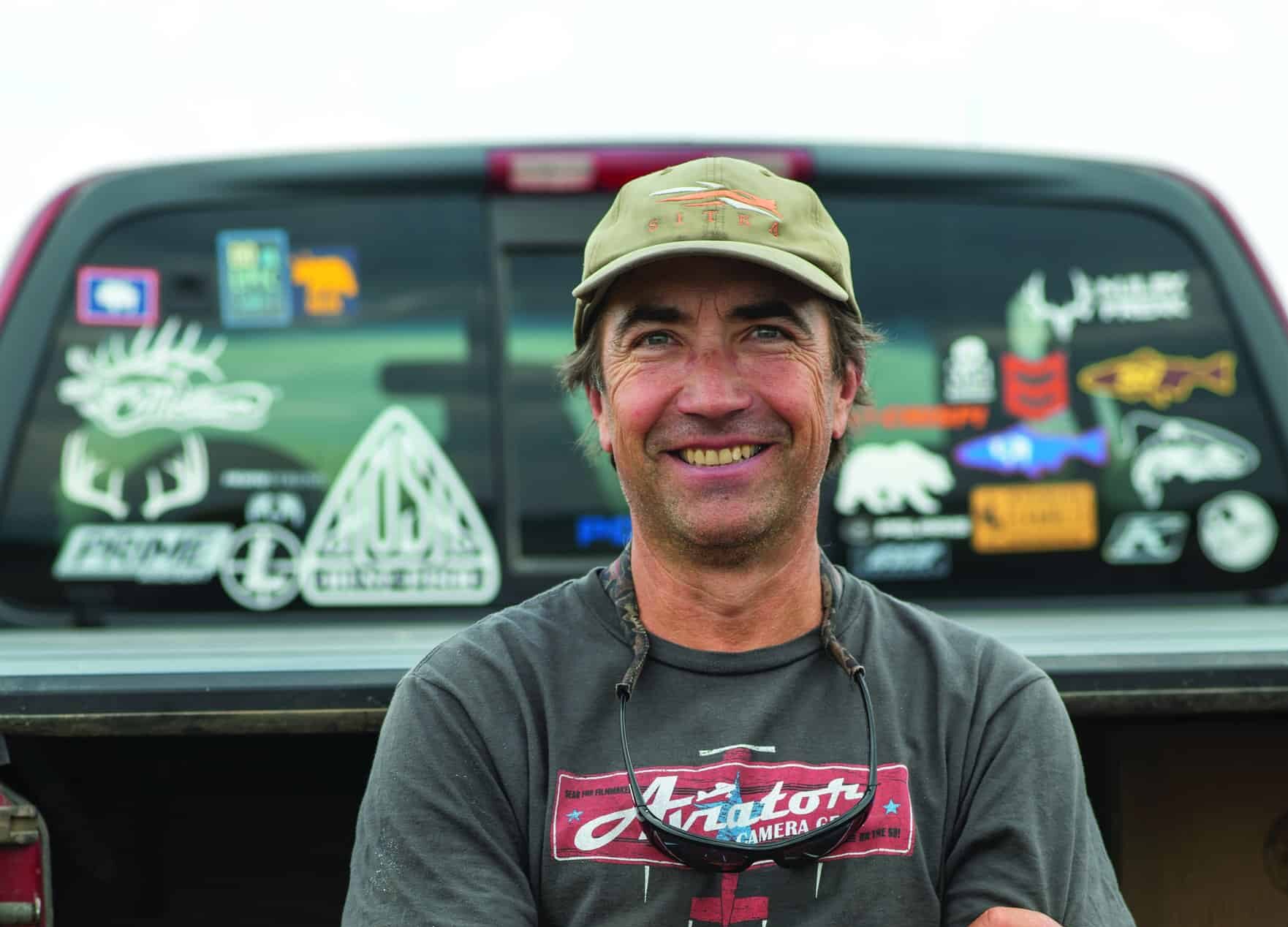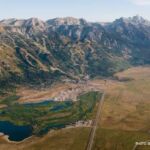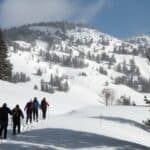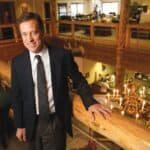Read The
Current Issue
John Griber
He’s a pioneering snowboard athlete and Emmy Award- winning cinematographer, but John Griber is most proud of the simple life he’s built here in Jackson Hole.
// by Bevin Wallace
John Griber has experienced all the adrenaline and drama that come with a lifetime of high-mountain expeditions and extreme sports, but these days he most appreciates the downtime he has in Jackson Hole with his wife and son. “We just love being in our surroundings and appreciating where we live,” Griber says about the family’s five-acre spot up in Game Creek, just south of Jackson. “It’s gorgeous up here. It’s insane.”
The 57-year-old has even got a relatively steady job—albeit one that regularly takes him to some of the most remote corners of Alaska, from Kodiak Island to the Bering Sea, in all times of the year—as a cameraman on the National Geographic TV series Life Below Zero, for which he has won several (he’s not sure exactly how many, but it’s somewhere between four and six) Emmys. “I’ve been really fortunate,” Griber says. “I’ve done so many different things.”
Griber’s family moved to Jackson in 1977 when he was 10 years old. He was a ski racer in high school and, after a coach suggested he take up cycling for dryland training, became a junior champion road racer. He transitioned to snowboarding after meeting Tom Sims, who gave him his first snowboard. As a snowboarder in the 1980s, he pioneered several first descents in the Tetons, and he traveled the world as an athlete sponsored by The North Face. He was the first American to snowboard from an 8,000-meter peak, Cho Oyu in Tibet. He has been on the summit of Mt. Everest twice. In the 1990s, he also served as the program director and head coach of the Jackson Hole Ski & Snowboard Club’s snowboard program.
John’s life story features plenty of adventure and adrenaline, but it’s also a poignant tale of understanding— and nailing—what matters most in life.
John’s life story features plenty of adventure and adrenaline, but it’s also a poignant tale of understanding— and nailing—what matters most in life.
After years being filmed by some of the best photographers and videographers in the world—including local legends Wade McKoy, Bob Woodall, Greg Von Doersten, Scott Simper, and Bud Fauwcett—he learned from them and started filmmaking himself in the early 2000s. He gradually moved into the reality TV realm as he got older and less inclined to risk his life—and cut into family time—in the Himalayas. His life story features plenty of adventure and adrenaline, but it’s also a poignant tale of understanding—and nailing—what matters most in life.
I was a pro rider with the original Sims team for, I didn’t even know, a stack of years, probably 10. Back in the early 80s, no one was snowboarding. Growing up in Jackson, riding at Teton Village, it was just all big-mountain riding, but that term hadn’t even been coined yet. We just rode. “Extreme” wasn’t even a thing.
Then all of a sudden, I get to be 40 years old and I’m like, holy shit, what am I gonna do with my life? I’d learned how to snowboard really well, and I’m a strong cyclist, but I have no real skill set. When you’re with a photographer, you’ll see a line and say, “Man, I can carve off this ridge or jump off this cliff. If you stand here, looks like to me like it’s gonna be a great shot.” You have that perspective. You’re already composing a lot of your images in your head. That’s how I became a cameraman—I think it’s a fascinating journey.
I did a lot of projects in the Himalaya. I’ve done 17 expeditions there, and I thought that path would continue. But when the season’s off in the Himalaya for climbing expeditions, you’re struggling for work. And there are up-and-coming shooters and videographers who are more capable of climbing an 8,000-meter peak now and filming it. So, I went down the reality path in TV, and it’s worked out well because it’s more of a stable job for the most part. I’ve done a lot of different shows, but most tend to be outdoor-based reality, almost docu-style—documenting people’s lives. That’s really amazing to me. I get to see so much.
Life Below Zero is a great show, and it’s a great cast that we cover. I filmed on the very first episode, and I’m still on it 10 years later. Being in Jackson for 45 years, my thing is living in the outdoors. I was a fly-fishing guide for 20 years in between going on expeditions, and I’ve always hunted—that’s just my lifestyle. And I cut my own firewood. Everything we film on the show, I do it. So, I can understand how the cast is thinking and what they’re doing.
It’s crazy that I’m in the reality-TV world because I thought I’d always only be in the mountains filming expeditions or ski touring or climbing in the Himalaya. I enjoy the travel and the quick little expeditions to Alaska and filming with people I know and respect.
The great thing with these film projects is, I go film, I document what I’m documenting, and then I come back and I have all my free time. That really has given me a lot of leeway and just a lot of time spent with my family. And time spent doing what I love—hunting and fishing and spending time in the outdoors. We can ski right out the backyard, up and over, and disappear into the mountains right from there.
Actually, in the winter I do a ton of ice fishing. After all of the stuff I’ve done, I sit on the frozen lake and totally Zen out. My life has been so on the edge and going, going, going for so long, it’s really nice to just relax and slow down.
I’m really proud of myself and my wife and how we’ve raised our son, Nevin, who means the world to us. I’m able be here in the present a hundred percent. We have a great quality of life when I’m home. I don’t bring any of the work home from the field. And I’m proud to say that we haven’t had a TV in 20 years. As a family we still sit down at the dinner table, we talk about the day, we listen to nice music, we sit on the deck. I just enjoy being home so much.
My mom died at 48 of cancer. I was 25, and I remember her saying, “Don’t live in the woulda, coulda, shoulda.” I’ve taken that to heart—I want to live in the moment, and I don’t want to have anything pass me by because I know how fragile life can be. JH





